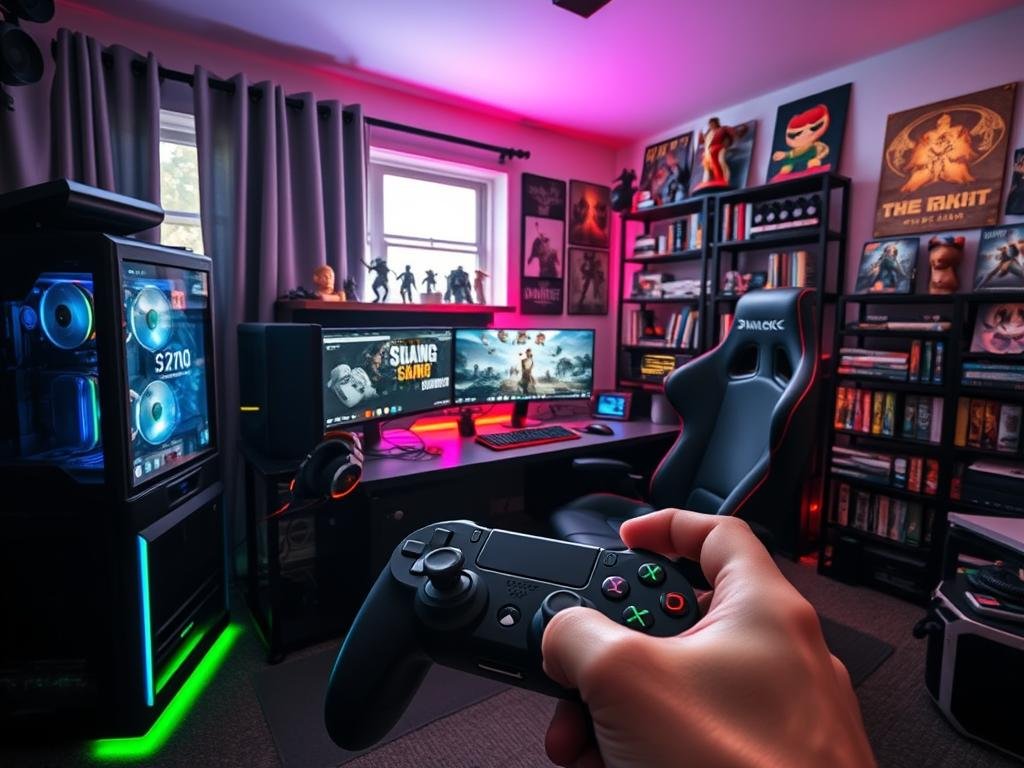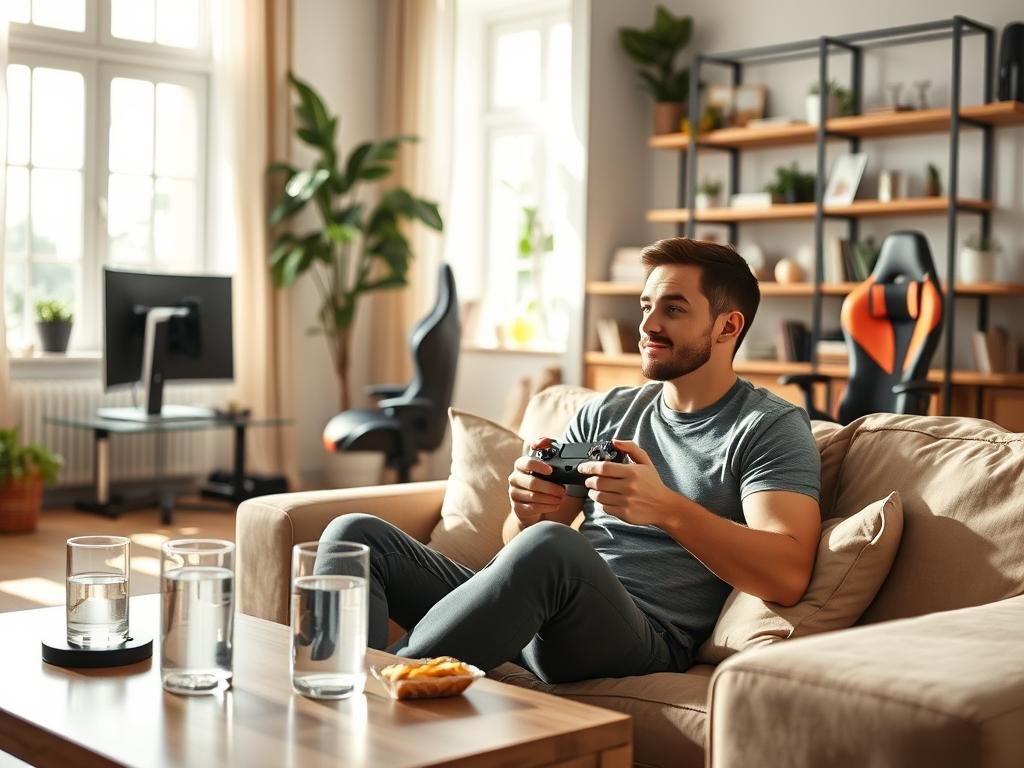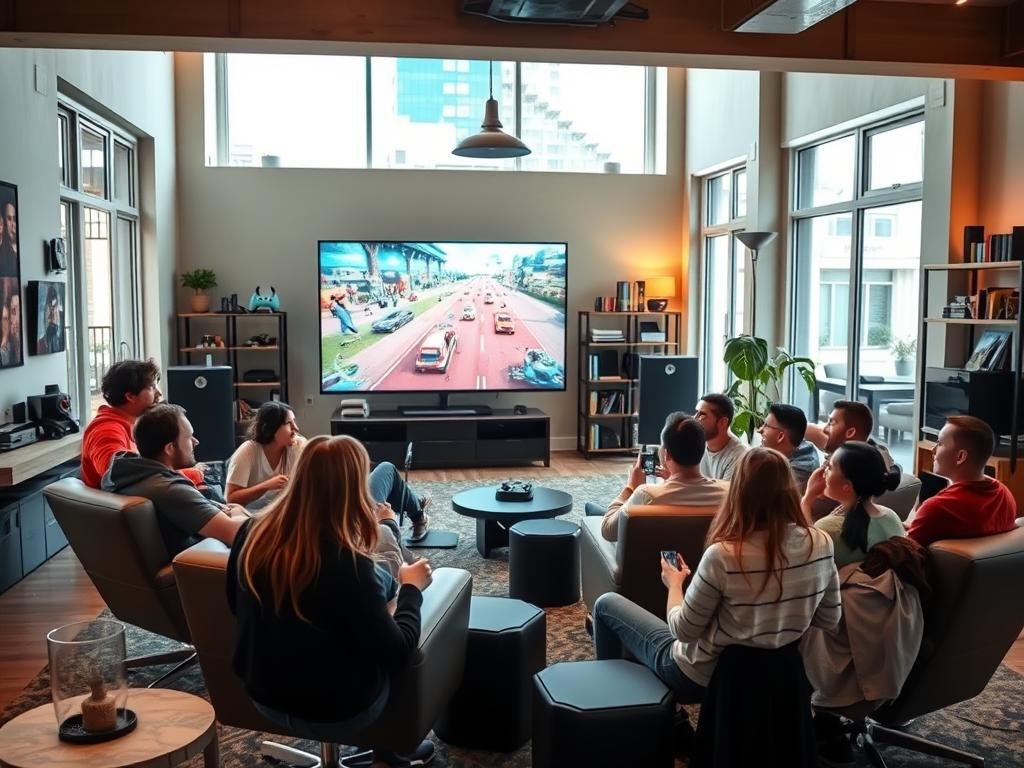Did you know that too much online gaming can harm your daily life? It can mess with your relationships, work, and health. While video games are fun, it’s key to keep a balance.
But how do you know if gaming is becoming a problem? Spotting the signs of addiction is the first step to a healthier gaming life. By knowing your gaming habits and finding a balance, you can enjoy gaming without it controlling your life.
Key Takeaways
- Excessive gaming can negatively impact daily life.
- Maintaining a healthy gaming balance is key.
- Spotting addiction signs is the first step to a healthier lifestyle.
- Knowing your gaming habits helps you enjoy gaming without issues.
- A balance lets you enjoy video games without harm.
Understanding Gaming Addiction
Gaming can become a disorder if it takes over your life. It affects your daily life, relationships, and well-being. Knowing the signs of gaming addiction is key to keeping a healthy balance.
Definition of Gaming Addiction
Gaming addiction, or internet gaming disorder, is when gaming becomes more important than everything else. The American Psychiatric Association says it can cause a lot of problems.
The World Health Organization has named gaming disorder a mental health issue. It’s important to know the difference between a passionate gamer and someone with gaming addiction.
Common Signs and Symptoms
Spotting gaming addiction early is vital. Look out for these signs:
- Thinking about gaming all the time, even when not playing
- Feeling upset or sad when you can’t play
- Playing more and more to feel the same excitement
- Ignoring other activities, hobbies, or friends because of gaming
- Keeping gaming up, even if it hurts your relationships, work, or school
Being in a gaming community can be good, but stay informed with gaming news. Keep your gaming life balanced.
By knowing what gaming addiction is and its signs, you can keep your gaming healthy and fun.
The Psychology Behind Gaming
The psychology of gaming is complex. It involves many factors that shape your gaming habits. Knowing these factors can help you understand why you play games and how they impact your life.
Why We Play Video Games
People play games for fun, to socialize, and to escape. Gaming culture has grown to offer many experiences. You might play to test yourself, unwind, or meet others with similar interests.
Gaming can also help you express yourself and find your identity. By trying out different games and communities, you can discover parts of your personality. You can also develop skills that help in real life.

The Role of Reward Systems
One major factor in gaming is the reward system. Games give rewards like points, badges, or levels. These rewards activate the brain’s reward centers, releasing dopamine and making you want to keep playing.
These systems are great at keeping you engaged. They tap into your need for achievement and progress. But, they can lead to addiction if not controlled. Knowing how reward systems work can help you manage your gaming better.
By understanding the psychological aspects of gaming, you can enjoy games in a healthy way. This ensures your gaming experience is positive and beneficial.
The Impact of Gaming on Daily Life
Gaming can change many parts of your life, like how you connect with others and how well you do at work. It’s important to see how gaming fits into your daily life and how it affects your happiness.
Effects on Relationships
Too much gaming can hurt your relationships with family and friends. Spending hours gaming can make you feel alone and leave your loved ones feeling ignored. A study showed that gamers who played more than four hours a day often had trouble with their relationships because of their gaming habits.
To keep your relationships strong, find a good balance between gaming and spending time with others. Make sure gaming doesn’t take over your time with family and friends.
Academic and Professional Consequences
Gaming can also affect your school or work life. Playing too much can make you less productive, miss deadlines, and do poorly in school or at work. A comparative analysis showed that students who played too much had lower grades than those who balanced gaming and school better.
| Aspect | Moderate Gaming | Excessive Gaming |
|---|---|---|
| Academic Performance | Higher GPAs | Lower GPAs |
| Professional Productivity | Maintained or Improved | Decreased |
| Relationship Quality | Healthy Relationships | Strained Relationships |
To avoid these problems, it’s key to have healthy gaming habits. Set time limits and focus on your tasks. This way, you can enjoy gaming without neglecting your duties or relationships.
Identifying Healthy Gaming Habits
It’s important to make sure gaming doesn’t harm your well-being. When you play online games, finding a balance is key. This balance helps you enjoy gaming without neglecting other parts of your life.
Setting Time Limits
Setting time limits is a great way to keep gaming healthy. Decide how much time you can spend gaming each day or week. Sticking to this helps you avoid letting gaming take over your life.
Many gamers use time management apps to keep their gaming in check. These apps give insights into your gaming habits. They help you make better choices about how to play.
Choosing the Right Games
The games you play can greatly affect your habits. Choose games that offer positive experiences and don’t lead to too much playing. Games with set tournament times can help you manage your play.
Look for games that match your interests and promote a healthy gaming lifestyle. Some games are made to help you balance gaming with other activities. Playing these games lets you enjoy online gaming without losing balance.

By using these strategies, you can enjoy gaming while keeping your life balanced. Healthy gaming habits are all about finding the right balance.
Tools and Apps for Managing Gaming Time
In today’s gaming world, many tools and apps help gamers keep track of their time. It’s key to manage time well for a healthy gaming life.
Popular Time Management Apps
Several apps help gamers manage their time better. For example, Freedom blocks distracting sites and apps on all devices. Moment tracks screen time and gives detailed reports on gaming habits.
Apps like Qustodio offer monitoring and control features. They let you set time limits and alerts for gaming. These tools are great for balancing gaming with other life aspects.
In-Game Features to Monitor Playtime
Many modern games have features to track playtime. Some show total playtime in the game menu. Others remind players to take breaks. Steam, a big gaming platform, tracks playtime and has parental controls.
Some games have reward systems to encourage breaks or limit play. Using these features helps gamers develop better habits and avoid too much gaming.
By using both apps and in-game features, you can manage your gaming time well. These tools are useful for all gamers, whether casual or hardcore.
The Importance of Moderation
Enjoying video games without harm comes down to moderation. As a gamer, you’re part of a lively gaming community that loves what you love. But, it’s key to keep a balance between gaming and other parts of your life.
Moderation in gaming lets you enjoy its good sides while avoiding the bad. By watching your gaming habits, you make sure gaming stays fun and positive.
Benefits of Balanced Gaming
Playing games in balance brings many benefits. It can improve your mental and physical health, strengthen relationships, and boost productivity. When you mix gaming with other activities, you’re more likely to dive into gaming reviews and gaming events that make your gaming better.
| Benefits | Description |
|---|---|
| Improved Mental Health | Reduces stress and anxiety by providing a healthy distraction. |
| Stronger Relationships | Fosters connections with others through shared gaming experiences. |
| Increased Productivity | Helps gamers manage their time more effectively, leading to greater productivity in other areas of life. |
Understanding Your Limits
Knowing your limits is key to a healthy gaming balance. This means knowing your gaming habits, setting limits, and focusing on other life areas. By doing this, you can join in gaming events and connect with your gaming community without harming yourself.

By valuing moderation and knowing your limits, you can have a more balanced and rewarding gaming life.
Alternative Activities to Gaming
Looking beyond screens can open up a world of new hobbies and friends. Gaming is fun, but it’s important to balance it with other activities for a healthy life.
Exploring Other Hobbies
Trying different hobbies can lead to discovering new passions. You might enjoy outdoor activities like hiking, cycling, or gardening. These not only give you a break from gaming but also help you connect with nature and stay fit.
Or, you could dive into creative pursuits like painting, writing, or playing music. These hobbies can be very rewarding and give you a sense of achievement outside of gaming.

Socializing Outside of Gaming
Socializing is key to a balanced life. Joining local clubs or groups that match your interests is a great idea. This could be a sports team, a book club, or a volunteer group. It helps you meet new people and expand your social circle beyond gaming.
Going to events like gaming tournaments or festivals is another way to socialize. Keeping up with gaming news can help you find out about these events and plan to attend.
By mixing up your activities and social life, you can find a better balance between gaming and other parts of your life.
When to Seek Help for Gaming Addiction
If you think your gaming habits are getting out of hand, it’s time to know when to ask for help. Gaming addiction can harm your mental and physical health, relationships, and daily life. Spotting the signs of a problem is the first step towards getting better.
Signs That You Need Professional Support
Gaming addiction is a serious issue that’s hard to beat alone. Some signs you might need professional help include:
- Neglecting responsibilities and activities because of gaming
- Keeping gaming despite the negative effects
- Feeling withdrawal symptoms when you can’t game
- Needing to game more often or for longer to feel good
If you see yourself in several of these signs, it’s time to get help from a mental health expert.
Resources for Treatment Options
There are many ways to get help for gaming addiction. These include:
| Resource | Description |
|---|---|
| Mental Health Professionals | Trained therapists can help with counseling and therapy to tackle the root causes of gaming addiction. |
| Support Groups | Support groups let you connect with others facing similar issues, giving you a sense of community and understanding. |
| Online Resources | Websites and online forums have lots of information, advice, and tools to manage gaming habits. |
Looking for help is a sign of strength. There are many resources ready to support you in beating gaming addiction.
By recognizing the problem and getting the right help, you can take back control of your gaming habits. This will improve your overall well-being.
Parental Guidance on Gaming
Parents need to be informed and proactive in guiding their children’s gaming. As gaming evolves, it’s key to understand its impact on your child.
Tips for Parents to Monitor Play
It’s important to monitor your child’s gaming habits. This ensures they balance gaming with other life aspects. Here are some tips:
- Set up a family gaming area where you can observe your child’s gaming activities.
- Use parental controls available on gaming consoles and PCs to limit playtime and monitor game content.
- Engage in conversations with your child about the games they play and their online interactions.
By being actively involved, you can better understand your child’s gaming habits and identify any issues early.
Establishing Healthy Gaming Rules
Setting clear rules is vital for promoting healthy gaming habits. Consider the following:
- Set time limits for gaming to ensure it doesn’t interfere with homework, physical activity, and socializing.
- Choose games that are appropriate for your child’s age and maturity level.
- Encourage breaks during long gaming sessions to reduce the risk of fatigue and eye strain.
By setting these rules, you help your child develop responsible gaming habits that can last a lifetime.
For more insights on managing your child’s gaming habits, consider exploring gaming reviews and staying updated on gaming events. These can provide valuable information on the latest trends and concerns in the gaming world.
The Role of Community in Gaming
The gaming community is key to a better gaming experience. It connects you with others, creating a supportive and fun environment.
Gaming communities are more than just playing games together. They’re about sharing, learning, and growing. Joining these groups can make your gaming better. Experts say, “Community engagement is vital for a healthy gaming world” (source). Learn more about the metaverse and its impact on gaming here.
Finding Support Through Online Groups
Online gaming communities let you connect with gamers worldwide. They focus on specific games or genres. Here, you can share tips, strategies, and experiences. Online forums and discussions offer valuable insights and help improve your skills.
Some benefits of online gaming communities include:
- Access to a vast pool of knowledge and resources
- Opportunities to team up with other gamers for co-op play
- A sense of belonging to a community that shares your interests
Joining Local Gaming Communities
Local gaming communities offer a more personal and interactive experience. By joining local groups, you can meet gamers in person. You can also participate in LAN parties and community events.
Local gaming communities provide:
- A chance to develop lasting friendships with fellow gamers
- Opportunities to participate in local tournaments and events
- A more immersive and social gaming experience
As community engagement becomes more important, joining a gaming community can greatly improve your gaming. Whether online or offline, these communities offer many benefits that can elevate your gaming experience.
The Future of Gaming and Mental Health
Gaming is changing fast, affecting how we play and think about mental health. The gaming world is growing, focusing on games that are fun and safe for our minds.
Emerging Trends in Responsible Gaming
The gaming world is getting better at being responsible. It’s doing this in several ways:
- Playtime tracking: Games now track and limit how much we play. This helps us keep a healthy balance.
- Mental health resources: Some games offer mental health help and support. They recognize gaming’s impact on our minds.
- Community guidelines: Gaming sites are making rules to cut down on mean behavior. This makes gaming safer for everyone.
These changes show a move towards a more caring gaming culture. By adopting these steps, the industry can lessen gaming’s risks. It aims to create a healthier gaming community.
Innovations in Game Design for Balance
Game designers are working hard to make games that are fun and balanced. They’re doing this in several ways:
- Dynamic difficulty adjustment: Games adjust their level of challenge based on how we play. This makes the game more enjoyable and less frustrating.
- Reward systems: New reward systems encourage us to take breaks or do other things. This helps us enjoy gaming without it taking over our lives.
- Wellness-focused features: Some games include features that help us relax and be mindful. These features add to a balanced gaming experience.
By adding these features, designers help us enjoy gaming without harming our mental health. As gaming evolves, we’ll see even more ways to balance fun and well-being.
Conclusion: Striking a Balance Between Fun and Health
When you play online games, remember to take care of yourself. It’s key to find a balance between fun and health. This way, you can enjoy games without harming your well-being.
Practices for Responsible Gaming
Playing games responsibly is important. Set limits on how long you play, pick games that are good for you, and be part of a gaming community that supports your health.
Final Thoughts on Awareness
Knowing the risks of online gaming helps you play safely. It keeps your mind and body healthy. The gaming community helps make gaming better for everyone. Together, we can all enjoy games more.
FAQ
What is gaming addiction, and how do I know if I’m addicted?
Gaming addiction happens when gaming takes over your life. It can ruin your relationships, work, or school. Look out for signs like spending too much time gaming, feeling upset when you can’t play, and ignoring other activities.
How can I maintain a healthy gaming balance?
To keep gaming healthy, set limits on how long you play. Choose games that make you feel good. Also, make time for other hobbies and activities.
What are the psychological factors that drive gaming behavior?
Gaming psychology shows why people play games. It’s about the rewards in games that make us feel happy. These rewards, like dopamine, make us want to play more.
How does gaming affect my daily life, including relationships and work or school performance?
Gaming can hurt your daily life. It can damage relationships, hurt your grades, and affect your job. It can lead to feeling lonely, being less productive, and poor time management.
What tools and apps can help me manage my gaming time?
There are many tools and apps to help you control gaming time. Apps like Freedom and SelfControl help. Games also offer features to track playtime and remind you to take breaks.
Why is moderation important in gaming, and how can I understand my limits?
Moderation is key to enjoying games without harm. Knowing your limits means recognizing addiction signs and understanding your gaming habits.
What are some alternative activities to gaming that I can explore?
Try new hobbies like sports, reading, or creative activities. Also, join clubs, go to events, or volunteer to meet people outside gaming.
When should I seek help for gaming addiction, and what resources are available?
Get help if gaming is taking over your life. Look for signs like too much gaming, feeling upset without it, or neglecting other activities. Treatment options include counseling, support groups, and online resources.
How can parents monitor their child’s gaming habits and establish healthy gaming rules?
Parents can use parental controls and track playtime. Talk openly about gaming. Set limits, encourage other activities, and show responsible gaming behavior.
What role does community play in gaming, and how can I find support through online groups or local gaming communities?
The gaming community offers support and friendship. Find support online or at local gaming events. This helps you feel connected and supported.
What are the emerging trends in responsible gaming, and how are game designers innovating to promote balance?
New trends in gaming include games that help you play responsibly. They offer time tracking and reminders. Game designers are also adding features to encourage breaks and balance.
